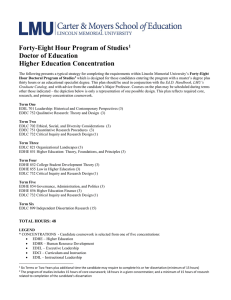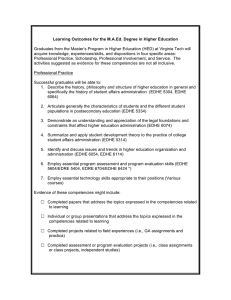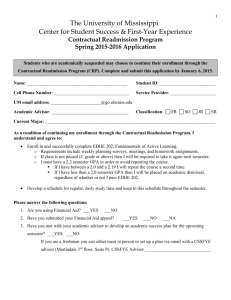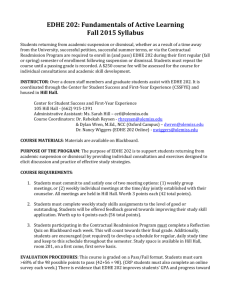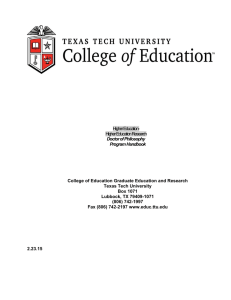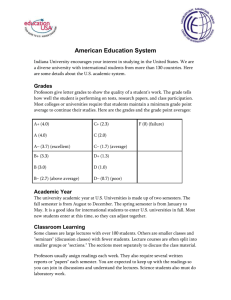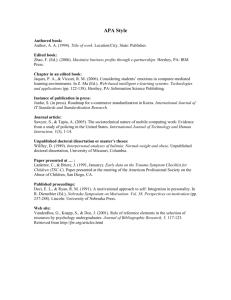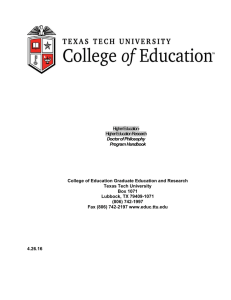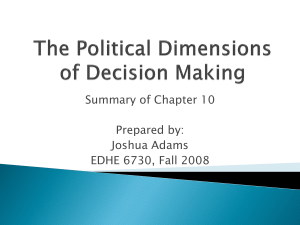Doctoral Degree Programs In Higher Education
advertisement
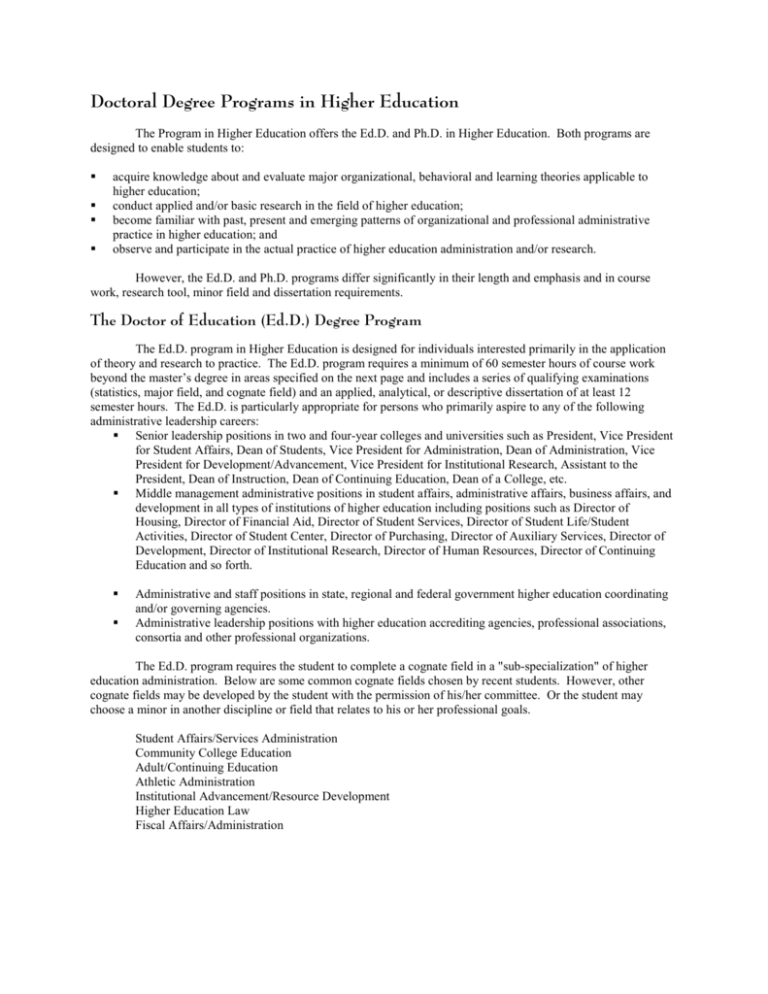
Doctoral Degree Programs in Higher Education The Program in Higher Education offers the Ed.D. and Ph.D. in Higher Education. Both programs are designed to enable students to: acquire knowledge about and evaluate major organizational, behavioral and learning theories applicable to higher education; conduct applied and/or basic research in the field of higher education; become familiar with past, present and emerging patterns of organizational and professional administrative practice in higher education; and observe and participate in the actual practice of higher education administration and/or research. However, the Ed.D. and Ph.D. programs differ significantly in their length and emphasis and in course work, research tool, minor field and dissertation requirements. The Doctor of Education (Ed.D.) Degree Program The Ed.D. program in Higher Education is designed for individuals interested primarily in the application of theory and research to practice. The Ed.D. program requires a minimum of 60 semester hours of course work beyond the master’s degree in areas specified on the next page and includes a series of qualifying examinations (statistics, major field, and cognate field) and an applied, analytical, or descriptive dissertation of at least 12 semester hours. The Ed.D. is particularly appropriate for persons who primarily aspire to any of the following administrative leadership careers: Senior leadership positions in two and four-year colleges and universities such as President, Vice President for Student Affairs, Dean of Students, Vice President for Administration, Dean of Administration, Vice President for Development/Advancement, Vice President for Institutional Research, Assistant to the President, Dean of Instruction, Dean of Continuing Education, Dean of a College, etc. Middle management administrative positions in student affairs, administrative affairs, business affairs, and development in all types of institutions of higher education including positions such as Director of Housing, Director of Financial Aid, Director of Student Services, Director of Student Life/Student Activities, Director of Student Center, Director of Purchasing, Director of Auxiliary Services, Director of Development, Director of Institutional Research, Director of Human Resources, Director of Continuing Education and so forth. Administrative and staff positions in state, regional and federal government higher education coordinating and/or governing agencies. Administrative leadership positions with higher education accrediting agencies, professional associations, consortia and other professional organizations. The Ed.D. program requires the student to complete a cognate field in a "sub-specialization" of higher education administration. Below are some common cognate fields chosen by recent students. However, other cognate fields may be developed by the student with the permission of his/her committee. Or the student may choose a minor in another discipline or field that relates to his or her professional goals. Student Affairs/Services Administration Community College Education Adult/Continuing Education Athletic Administration Institutional Advancement/Resource Development Higher Education Law Fiscal Affairs/Administration The Ed.D. Curriculum The Common Higher Education Doctoral Core . . . . . . . . . . . . . . . . . . (15) The common Higher Education doctoral core provides the student with a broad overview and a common integrated perspective of Higher Education as a field of study and academic enterprise. With these courses as a foundation, the student should be able to intelligently examine the conceptual basis of higher education institutions as complex social organizations in a complex society and build a more in-depth understanding in one or more areas of specialization. EDHE 6050 EDHE 6510 EDHE 6520 EDHE 6700 EDHE 6710 Teaching and Learning in Higher Education History of Higher Education Research on Students in Higher Education [online hybrid course section] The Role of Higher Education in a Democracy [online course section] General Administration of Higher Education [online hybrid course section] Ed.D. Higher Education Base Course Requirements . . . . . . . . . . . . . . . (9) The Ed.D. base course requirement provides the student with a knowledge of the main areas of administrative specialization common to most institutions of higher learning. Each student must complete AT LEAST THREE of the following base courses: EDHE 6570 EDHE 6720 EDHE 6730 EDHE 6740 EDHE 6750 EDHE 6760 EDHE 6780 EDHE 6790 The Professoriate in Higher Education Academic Administration in Higher Education Organization & Administration of Student Development Services [online hybrid course section] Planning and Analytical Systems Human Resource Development in Higher Education Higher Education Finance [online hybrid course section] Educational Resource Development in Higher Education Legal Aspects of Higher Education Internship . . . . . . . . . . . . . . . . . . . . . . . . . . . . . . . . . (0-6) In addition to the course work specified above, a supervised administrative internship of up to 180 clock hours (each 3 semester hour course registration requires 90 clock hours) shall be required of any student who has not been employed in a full-time position in an institution, agency or professional association of higher education for at least one academic year or the equivalent (as determined by the Higher Education faculty), prior to taking qualifying (comprehensive) examinations. The internship prepares the student to relate theoretical concepts to administrative practice and to gain work experience in one or more areas of higher education administration. Minor or Cognate Area . . . . . . . . . . . . . . . . . . . . . . . . . . . (12/15) The cognate area is designed to allow the student to conduct in-depth study in a specific aspect of higher education. Possibly cognate areas include but are not limited to: student affairs administration, community college administration or teaching, policy studies in higher education, adult and continuing education, institutional planning and analysis, legal aspects of higher education, multi-cultural education in higher education, governance of higher education, etc. As part of this requirement, students may take up to three hours of independent study (EDHE 6900) and/or three hours of Studies in Higher Education (EDHE 6850). A minor requires 12 credit hours in a field or discipline related to one’s professional goals. A cognate within the program requires 15 credit hours. College of Education Core and Higher Education Research Requirement . . . . . . . (9) Competence in research, statistics and scholarly inquiry is required of all doctoral students in the College of Education. In the Program in Higher Education this is accomplished in four ways: (1) completion of the College of Education Core courses in research and statistics; (2) attainment of a passing score on a college examination in educational statistics and research methodology, or on an exam developed by the Program; (3) completion of a course on conducting and evaluating quality research on higher education issues; and (4) completion of an acceptable dissertation. College of Education Core (6) EPSY 5210 Educational Statistics (Prerequisite for EPSY 6010--not counted toward the degree) EPSY 6010 Statistics for Educational Research EPSY 6020 Methods of Educational Research Higher Education Program Research Course Requirement (3) EDHE 6530 Research on Higher Education [EDHE 6530 should be taken after completion of EDER 6010 and 6020.] Residency Requirement To meet the residency requirement for the Ed.D program, students are required to enroll in a minimum of 18 semester hours during a calendar year. The residency requirement should be completed during the time the student completes the above course requirements. This represents completion of course work for the degree. At this point one takes and passes the program written and oral qualifying exams. Dissertation Research Requirement (Minimum) . . . . . . . . . . . . . . . . . (12) The Ed.D. dissertation may be related to immediate operational programs of any aspect of higher education, either in an analysis and solution format or in an application of theory or research context. Minimum TOTAL for the Ed.D. (including Dissertation Research Hours) . . . . . . (60-66) beyond the Master's Degree OR 90-96 hours beyond the Bachelor's Degree The Doctor of Philosophy (Ph.D.) Degree Program The Ph.D. program in Higher Education serves individuals interested primarily in scholarly research on and in the teaching of Higher Education as a field of study. It requires a minimum of 72 semester credit hours beyond the master's degree in areas specified on the next page and includes a series of qualifying examinations (admission, statistics, major field and minor field) and a conceptual or theoretically based dissertation of at least 12 semester hours that is generalizable to the field of higher education and of publishable quality. The Ph.D. is appropriate for those persons who aspire to the following careers: Academic teaching and/or research positions in graduate programs of higher education, higher education institutes and/or centers for the study of higher education, Senior leadership positions in comprehensive and/or doctoral/research universities where in-depth knowledge and understanding of the conceptual bases of higher education and the administration of higher education are required, Applied research and senior leadership positions in institutions of higher learning, medical centers, government agencies, consortia of higher education institutions, and higher education professional associations, Research and senior leadership positions in statewide higher education coordinating agencies and multicampus system offices. The Ph.D. Curriculum The Common Higher Education Doctoral Core . . . . . . . . . . . . . . . . . . (15) The common Higher Education doctoral core provides the student with a broad overview and a common integrated perspective of Higher Education as a field of study and academic enterprise. With these courses as a foundation, the student should be able to intelligently examine the conceptual basis of higher education institutions as social organizations in a complex society and to build a more in-depth understanding in one or more areas of specialization. EDHE 6050 EDHE 6510 EDHE 6520 EDHE 6700 EDHE 6710 Teaching and Learning in Higher Education History of Higher Education Research on Students in Higher Education The Role of Higher Education in a Democracy General Administration of Higher Education [online hybrid course section] [online course section] [online hybrid course section] Ph.D. Higher Education Base Course Requirements . . . . . . . . . . . . . . . . (9) The Ph.D. base course requirement is designed to teach the student the contextual basis of Higher Education and organizational concepts common to the teaching, administration and study of Higher Education. These courses provide the student with a conceptual and theoretical base on which to build a specialization and/or research focus. Each student must complete AT LEAST THREE of the following courses: EDHE 6500 Essentials of Academic Publishing in Higher Education EDHE 6550 Policy Studies in Higher Education EDHE 6570 The Professoriate in Higher Education EDHE 6720 Academic Administration EDHE 6740 Planning and Analytical Systems in Higher Education EDHE 6750 Human Resource Development in Higher Education EDHE 6760 Higher Education Finance [online hybrid course section] EDHE 6780 Educational Resource Development in Higher Education EDHE 6790 Legal Aspects of Higher Education Higher Education Elective Course Requirements . . . . . . . . . . . . . . . . . (6) To develop a broader exposure to or an in-depth knowledge of a specialized area, the student may select AT LEAST TWO additional EDHE courses from the Higher Education course inventory. As part of this requirement, students may select three hours of independent study, EDHE 6900, and/or three hours of Studies in Higher Education, EDHE 6850. Internship . . . . . . . . . . . . . . . . . . . . . . . . . . . . . . . . . (0-6) Prior to taking qualifying exams, an administrative and/or research internship of up to 6 semester hours is required of students who have not been employed in a full-time administrative, teaching or research position in higher education for at least one academic year, or the equivalent as determined by the Higher Education faculty. Administrative internships shall consist of at least 90 clock hours of closely supervised administrative work for each three semester hours of credit and culminate with a written report of the internship experience. Research internships shall require the close supervision of the student's research project by a Higher Education Program faculty member and culminate in a publishable or presentable research paper. These internships provide students valuable administrative and/or research experience in higher education so that they may relate theory to practice and fully appreciate the complexities involved in the study and/or administration of higher education. Minor or Cognate Field Requirement . . . . . . . . . . . . . . . . . . . . . . (12/15) A student may choose to complete a cognate area specializing in higher education or a minor field in a discipline which relates to one’s professional goals. Either provides the student with a unified, intensive concentration of course work in a specialization in higher education or in an academic or professional area outside of the field of education. Minor field course work must include 12 credit hours in a single graduate discipline or field of study. A cognate within the program requires 15 credit hours. College of Education and Higher Education Research Requirement . . . . . . . . . . (9) Acquiring and demonstrating evidence of competence in research, statistics and scholarly inquiry is required of all doctoral students in the College of Education. In the Program in Higher Education this is accomplished in four ways: (1) completion of the College of Education Core courses in research and statistics; (2) attainment of a passing score on a college-wide examination in educational statistics and research methodology or on an educational statistics and research exam given by the Program; (3) completion of a course on conducting and evaluating quality research on higher education issues; and (4) completion of an acceptable dissertation. Ph.D. students are also required to complete the second Research Tool Requirement specified below. College of Education Core (6) EPSY EPSY EPSY 5210 Educational Statistics (Prerequisite for EDER 6010--not counted toward the degree) 6010 Statistics for Educational Research 6020 Methods of Educational Research In addition to these courses, the student must pass comprehensive written examinations that cover the content of these research courses. Higher Education Program Research Course Requirement (3) EDHE 6530 Research on Higher Education [EDHE 6530 should be taken after completion of EDER 6010 and 6020.] Research Tool Requirement . . . . . . . . . . . . . . . . . . . . . . . . . . (9) Because the Ph.D. is, by definition, a research degree, each Ph.D. candidate must be competent in the modes of scholarly inquiry. In Higher Education those modes include descriptive, relational, experimental and historical studies, which use qualitative and/or quantitative research designs and analyses. Therefore, Ph.D. students must complete 9 semester hours in statistics and research methodology (beyond those courses on taken by all doctoral students and required by the college. Specifically, THREE or more of the following recommended courses must be completed for a total of AT LEAST 9 credit hours to fulfill this research requirement: EPSY 5240 EPSY 6005 EPSY 6210 EPSY 6240 EPSY 6230 EPSY 6290 EPSY 6280 EPSY 6285 EPSY 6300 EPSY 6850 Survey Research Methods in Education Statistical Theory and Simulations Multiple Regression Analysis and Related Methods Educational Data Processing Advanced Research Design [prerequisite EDER 6240] Multivariate Statistics in Education Qualitative Research in Education Qualitative Data Analysis Applied Research in Education Studies in Higher Education: Quantitative Research in Higher Education At this point the student has completed course work in the classroom and now applies to take and complete the doctoral qualifying, comprehensive written and oral exams. Residency Requirement Residency for the Ph.D. which is defined as completion of nine semester hours in two consecutive semesters should be completed during the course work phase of study. Dissertation Research (Minimum) . . . . . . . . . . . . . . . . . . . . . . . (12) The Ph.D. dissertation should demonstrate the student's ability to conduct independent research. The research design, sampling procedures and methods of analysis should be congruent with the modes of inquiry used in conducting research on higher education and should be a report of independent research resulting in knowledge generalizable to the field. Moreover, the dissertation should be of publishable quality and should make a bona fide contribution to pressing or emerging issues in higher education. Minimum TOTAL for the Ph.D. (including Dissertation Research Hours) . . . . . . (72-78) beyond the Master's Degree OR 102-108 beyond the Bachelor's Degree.
